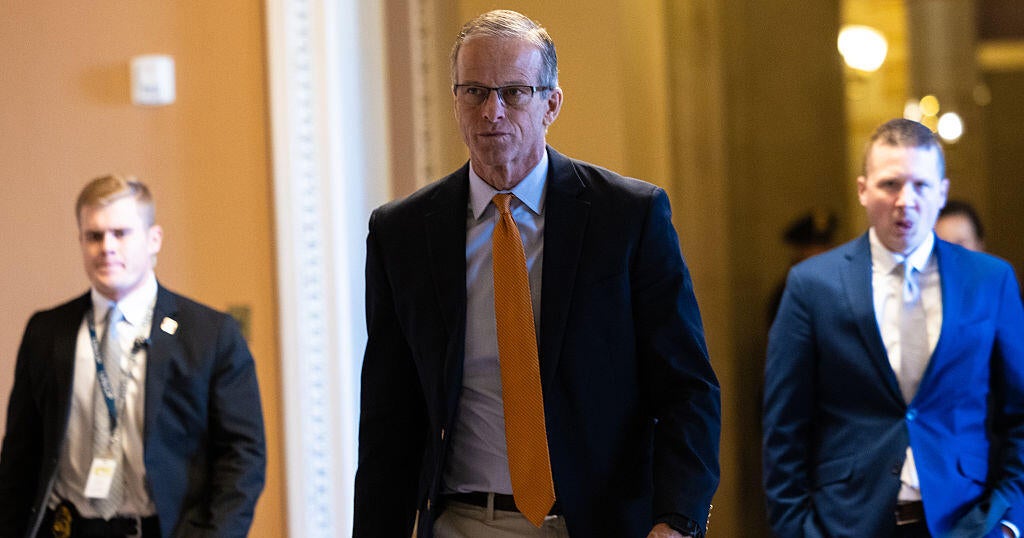2024 GOP presidential contenders criticize debt ceiling deal
As Congress moves closer to passage of a bill to raise the debt limit and avoid a catastrophic U.S. default, some 2024 Republican presidential hopefuls are weighing in on the legislative deal reached between House Republicans and President Biden — and taking aim at Washington over spending.
After months of standoffs, negotiators reached a deal Saturday ahead of June 5, the date by which the Treasury Department estimates the government will run out of money to pay its obligations. The agreement suspends the debt limit until early 2025 after the presidential election. It also locks in non-defense spending for 2024 at 2023 levels before allowing a slight increase in 2025.
The bill passed the House in a strong bipartisan vote Wednesday evening, by a margin of 314 to 117. It now goes to the Senate.
Democratic and Republican leaders alike are touting the agreement as a victory, but the GOP presidential hopefuls are unimpressed. Here's a round-up of their responses:
Nikki Haley
"The best way to fix Washington's spending addiction is to elect people who have not been part of the problem," said former South Carolina Governor Nikki Haley of the debt ceiling bill. "Adding at least $4 trillion to America's $31 trillion national debt over two years without substantially cutting spending is no way to run our country's fiscal affairs. Business as usual won't get the job done."
Haley's campaign also criticized past actions by her 2024 opponents former President Donald Trump and Florida Governor Ron DeSantis — when he was in Congress — for their past actions to raise the debt limit.
Ron DeSantis
Hitting the campaign trail in Iowa this week for the first time since the Florida governor announced his presidential candidacy, DeSantis indicated political leaders in Washington had failed. He told Iowans the U.S. was headed toward bankruptcy before the deal and "is still careening towards bankruptcy."
He criticized the agreement for keeping spending at COVID-era levels, calling it "unsustainable," and instead held up Florida's economy as an example to emulate.
Speaking with reporters after a rally on Tuesday night, DeSantis said that the nation's spending problems preceded President Biden, and he blamed Trump's spending bill in part for the fiscal challenges the country is continues to face.
As a congressman in 2018, DeSantis voted against an omnibus spending bill passed during Trump's presidency, but that same year he did vote to suspend the debt ceiling until 2019, after the midterms. That bill was signed into law by Trump.
Donald Trump
The former president raised or suspended the debt limit three times while he was in office, and the national debt ballooned from less than $20 trillion to nearly $27 trillion when he left office four years later.
Trump was quiet for several days on the issue but finally weighed in on the debt ceiling deal in an interview Wednesday night, saying he guessed the deal would pass. He also claimed he would "properly and permanently" fix the country's debt issues if reelected, but he did not explain how, and the national debt expanded during his first term.
Earlier this month before the standoff had been resolved, Trump encouraged Republican lawmakers to allow the U.S. default for the first time ever if Democrats did not agree to "massive cuts." On Wednesday, he said he would have taken default if he had to but claimed House Speaker Kevin McCarthy "worked very hard."
Tim Scott
But when it comes to the debt ceiling deal – the only current GOP presidential candidate who will actually cast a vote on the agreement is Republican Sen. Tim Scott. He said this week he would not support the deal.
"The short answer is no," Scott said when asked about the bill at an event hosted by Axios on Wednesday. Despite praising McCarthy for getting the White House to negotiate, Scott said he could not support a deal that allows the president to spend without limits.





